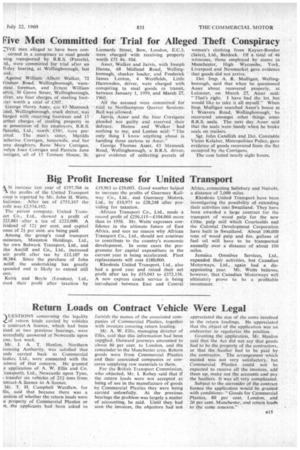Return Loads on Contract Vehicle Were Legal
Page 49

If you've noticed an error in this article please click here to report it so we can fix it.
U ESTI ONS concerning the legality of return loads carried by vehicles n contract-A licence, which had been used at two previous hearings, were iccessfully answered at Newcastle upon yne, last week.
Mr. J. A. T. Hanlon, Northern ieensing Authority, was satisfied that )ods carried back to Commercial lasties, Ltd., were connected with the isiness of that concern. He granted e application of A. W. Ellis and Co. :'ransport), Ltd., Newcastle upon Tyne, transfer six vehicles of 211 tons from mtract-A licence to A licence.
Mr. T. H. Campbell Wardlaw, for His, said that because there was a Jestion of whether the return loads were e property of Commercial Plastics or )t, the applicants had been asked to furnish the names of the associated companies of Commercial Plastics, together with invoices covering return loading.
Mr. A. W. Ellis, managing director of Ellis, said that this information had been supelied. Outward journeys amounted to about 80 per cent. to London, and the remainder to the Manchester area. Return goods were from Commercial Plastics and their associated companies or concerns supplying raw materials to them.
For the British Transport Commission, who objected, Mr. I. Robey. said that if the return loads were not accepted as being of use in the manufacture of goods by Commercial Plastics they were being carried unlawfully. At the previous hearings the problem was largely a matter of accounting, he said. Until they had seen the invoices, the objectors had not appreciated the size of the sums involved in the return loadings. He appreciated that the object of the application was an endeavour to regularize the position.
Granting the application, Mr. Hanlon said that the Act did not say that goods had to be the property of the contractors, or that the haulier had to be paid by the contractor. The arrangement which existed was not very satisfactory, but Commercial Plastics could not be expected to receive all the invoices, add them up, make out the accounts and pay the hauliers. It was all very complicated.
Subject to the surrender of the contract licence the application would he granted with conditions: "Goods' for Commercial Plastics, 80 per cent. London, and 20 per cent. Manchester, and return loads to the same concern."




































































































